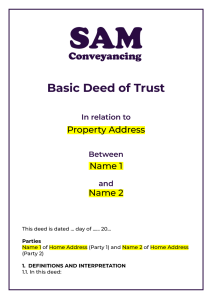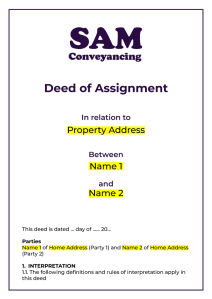How to Split Ownership of Property
When buying a house or investing in a buy-to-let property with others, you should clarify how to split ownership of the home. Failure to define these shares at the outset can lead to financial disadvantage, tax inefficiencies, or even costly legal battles, especially if one party contributes more (such as mortgage repayments) or circumstances change.
We'll show you how to formally establish your share, whether you're on the title deeds or not, and outline the steps to claim or transfer your portion, ensuring your investment is secure and your intentions are legally documented from day one.
How do you know if you've got a share in property?
As a general rule, if you have contributed money towards the property, then you likely own a beneficial share of the ownership, even if it's not explicitly stated in writing at the outset. This is a fundamental aspect of joint home ownership.
Financial contributions that indicate you have a share
If you have made any of the following financial contributions, whether you are named on the title deeds or not, the legal owners often hold the property on trust for you as a beneficial owner. This is typically known as a Constructive Trust or an Implied Trust.
- Contribution to the Purchase Price: This includes any portion of the deposit or direct payments towards the initial acquisition of the property.
- Mortgage Repayments: Regularly contributing to the mortgage payments, even if you're not named on the mortgage itself.
- Significant Repairs and Renovations: Paying for substantial improvements or essential maintenance that adds value to the property.
While these contributions suggest a beneficial interest, formally documenting your share (Deed of Trust, Floating Deed of Trust, or Deed of Assignment) is always the safest approach to prevent future disputes.
It's difficult to prove a Constructive Trust if you haven't recorded the agreement in writing. You'll also need to prove that you acted in detriment to yourself based on the agreement, meaning you caused yourself a loss.
Protect your interest in a property and confirm how to sell. Drafted by a solicitor.
The first draft is within 1 to 2 working days* and includes:
- Deposit paid.
- The percentage ownership of each party.
- How to share expenses like the mortgage and bills.
- Share of property income - rent or gain on sale.
- How to sell the property.
- How the property is divided in the event of separation, divorce, or death.
Beneficial vs Legal Ownership
In the world of property, co-ownership hinges on a crucial distinction: legal ownership versus beneficial ownership. While often held by the same individuals, these two forms of ownership can be separate, and knowing the difference is vital for anyone involved in joint home ownership.
Beneficial Ownership
Beneficial ownership, also known as 'equitable ownership', determines who is entitled to the financial value and income from the property. This includes receiving rental income, the proceeds from a sale, or any other financial benefit.
Beneficial owners are the true 'economic' owners, and their shares can be held in equal or unequal proportions, irrespective of the number of legal owners.
Essentially, the legal owners hold the property on trust for the beneficial owners, meaning they manage it for the benefit of those with a financial stake.
Legal Ownership
Legal ownership refers to the individual(s) whose name(s) are officially registered on the title deeds at the Land Registry. These are the people the law recognises as having the right to manage and deal with the property, such as selling it or taking out a mortgage. In England and Wales, a property can have a maximum of four legal owners.
Why is this distinction important?
- Recognising Contributions: It allows individuals who contribute financially (e.g., deposit, mortgage, renovations) to have their share formally recognised, even if they're not on the legal title.
- Tax Implications: For buy-to-let properties, rental income is taxed according to beneficial shares, not legal shares, making it key for tax planning.
- Dispute Resolution: In relationship breakdowns or disputes, beneficial ownership dictates how the property's value is divided.
- Inheritance: How beneficial interest is held (e.g., as Tenants in Common) impacts who inherits the financial value of the property upon death.
Proving your property share
The real protection in co-ownership of property comes from formally establishing and proving your share. Without clear documentation, your financial contributions and intentions in a joint home ownership agreement could be vulnerable to disputes.
Here are some methods to formally document or prove beneficial ownership:
A Deed of Trust is the most definitive way to record how beneficial interest in a property is split.
It is a legally binding document, often referred to as an 'Express Trust', that clearly states the proportions in which each co-owner holds the property's financial value.
This removes any ambiguity and is highly recommended when purchasing property together, especially if contributions are unequal or if some beneficial owners are not legal owners. It is not up for debate once signed.
While less formal than a Deed of Trust, you can put your intentions for the property in writing (e.g., an email, letter, or even text messages).
An oral agreement can also exist, but it is significantly harder to prove in court without supporting evidence. These types of agreements can provide evidence of a common intention to share beneficial ownership in a certain way.
Even without a formal written agreement, you can still prove you have a beneficial split through evidencing financial contributions towards the property (as discussed in the previous section).
This is often established through a Constructive Trust or an Implied Trust, where the court infers an intention to share beneficial ownership based on the parties' conduct and contributions.
The main issue here is that the legal costs for proving this interest through litigation can be considerable and time-consuming.
Share rental income or transfer property ownership quickly and easily with a Deed of Assignment.
Get your first draft within 1-2 working days*.
Our experienced solicitors draft deeds for various purposes, from buy-to-let transfers to protecting your interest in the family home.
- Transfer rental income efficiently.
- Assign Capital Gains securely.
- Transfer full or partial ownership seamlessly.
Changing ownership shares
Life circumstances often change, and with them, the need to adjust how co-ownership of property is structured. Whether it's due to a new relationship, a separation, tax planning for a buy-to-let, or simply a desire to formalise contributions, changing ownership of house shares is a common process. This involves altering either the legal or beneficial ownership, or both.
Transfer of Equity
A Transfer of Equity is the legal process of adding or removing a legal owner from the property's title deeds at the Land Registry (e.g., from Joint Tenants to Tenants in Common). This is a formal conveyancing process that requires a solicitor.
- Adding an Owner: Common when a partner moves in and contributes financially, or parents add a child to the property.
- Removing an Owner: Often occurs during a relationship breakdown, divorce, or when one party is bought out.
- Mortgage Consent: If there is an existing mortgage on the property, you will almost certainly need the lender's consent before proceeding with a Transfer of Equity. Without it, you could be in breach of your mortgage terms.
- Stamp Duty Land Tax (SDLT): SDLT may be payable on a Transfer of Equity, particularly if there is a mortgage on the property and the person being added or removed is taking on or releasing a share of that mortgage debt that exceeds the current SDLT thresholds (e.g., £40,000 for certain transfers). This won't be applicable if part of a divorce or dissolution.
Deed of Assignment
If you wish to change only the beneficial ownership proportions without altering the legal title (i.e., who is registered at the Land Registry), a Deed of Assignment can be used. This document formally assigns a portion of the beneficial interest from one person to another.
- Flexibility: This is particularly useful for tax planning, such as transferring beneficial interest in a buy-to-let to a spouse to optimise rental income tax, without needing lender consent (though always check your mortgage terms).
- No Legal Title Change: The names on the Land Registry remain the same.
- SDLT: Generally, no Stamp Duty is payable if there is no 'consideration' (money or mortgage debt) changing hands for the assignment of beneficial interest.
Severance of Joint Tenancy
If a property is currently held as 'Joint Tenants' (where owners own 100% jointly and the share automatically passes to survivors), and you wish to change to 'Tenants in Common' (where each owner has a distinct, divisible share), you must formally sever the joint tenancy (also known as a 'Notice of Severance'). This creates individual beneficial shares that can then be dealt with separately (e.g., passed on in a will or assigned via a Deed of Trust).
- Essential for Unequal Shares: Severing is a prerequisite if you want to hold unequal beneficial shares or pass your share to someone other than the surviving joint owner(s).
- Simple Process: It can often be done unilaterally by one joint tenant informing the others in writing.
You must write a will after you sever a joint tenancy.
Shared Equity vs Shared Ownership
When exploring options for co-ownership of property, you might encounter the terms 'shared equity' and 'shared ownership'. While they sound similar and both involve sharing a property, they represent different legal and financial arrangements.
Shared Equity Schemes
Shared equity schemes typically involve purchasing a property with a loan (often from a developer or the government) that covers a portion of the property's value. You own 100% of the property, but a percentage of the purchase price is covered by an equity loan, which is usually interest-free for an initial period (e.g., 5 years).
When you sell the property, you repay the loan plus a percentage of any increase in the property's value equivalent to the equity loan percentage.
- You Own 100%: You are the sole legal and beneficial owner of the entire property.
- Equity Loan: A portion of the property's value is covered by a loan, which is repaid based on the property's future value.
- No Rent: You do not pay rent on the portion covered by the equity loan.
- Example: Help to Buy Equity Loan was a prominent example of a shared equity scheme. The newest is the New Build Boost Scheme.
Shared Ownership Schemes
Shared ownership is a government-backed scheme designed to help people who cannot afford to buy a home outright. With shared ownership, you buy a share of a property (e.g., 25% or 50%) and pay rent on the remaining share, which is owned by a housing association.
You can usually buy more shares over time, a process known as 'staircasing', until you own 100% of the property (though some properties may have restrictions on owning 100% in certain areas).
- Part Buy, Part Rent: You own a percentage of the property and pay rent on the unowned portion.
- Housing Association: The remaining share is owned by a housing association.
- Staircasing: You have the option to buy more shares of the property over time.
- Leasehold: Shared ownership properties are almost always leasehold.
- Eligibility Criteria: There are specific income and other eligibility criteria to qualify for shared ownership.
Both schemes aim to make homeownership more accessible; their fundamental structures, the rights and responsibilities of the homeowner, and the way the 'shared' element works are distinctly different.
Book a FREE* 15-minute meeting with a property dispute specialist who will listen to your issue and suggest ways forward, including the costs, with no obligation to use our services after the free meeting.
- What are you due on sale?
- How to sell where one person doesn't want to.
- Mediation and Settlement Agreements.
- Applications to court, including Declaratory Orders, Regulatory Orders, Occupational Rent.
Getting your share of the property
Once you have established or proven your share in a property, the next step is often to realise that share financially. This typically occurs when one co-owner wishes to exit the arrangement, perhaps due to a change in circumstances, a relationship breakdown, or simply a desire to release their investment. There are generally two primary ways to get your share of the property's value:
A co-owner buys the share (Transfer of Equity)
The most straightforward method is often for one or more of the existing co-owners to buy out your share of the house.
This process involves a Transfer of Equity, where the legal and/or beneficial ownership is formally transferred to the remaining owner(s).
The financial aspect of this involves agreeing on a valuation for your share and arranging payment.
If there's a mortgage involved, the remaining owner(s) will need to demonstrate they can afford to take on the full mortgage, and lender consent will be required.
Agreement to sell the property
If a buy-out isn't feasible or desired, the alternative is to sell the entire property on the open market.
The proceeds from the sale, after deducting any outstanding mortgage and selling costs, would then be distributed among the beneficial owners according to their agreed or proven shares. This is often the simplest way to get your share if all parties agree.
When an agreement can't be reached: Forcing a Sale
The challenge in forcing a sale arises when a co-owner cannot afford to buy out your share, or, more commonly, when a co-owner doesn't want to sell the property.
In such cases, you may need to apply to the court for an Order for Sale under the Trusts of Land and Appointment of Trustees Act (TOLATA) 1996.
- Court Intervention: The court has the power to order the sale of a jointly owned property, even if one owner objects.
- Factors Considered: When deciding whether to order a sale, the court considers various factors, including the purpose for which the property was acquired (e.g., investment vs. family home), the welfare of any children, and the interests of any secured creditors.
- Investment vs. Family Home: You are generally more likely to get an order to sell if the property was acquired purely as an investment (e.g., a buy-to-let). If the property was intended as a marital or family home, especially if children still reside there, the court may be more reluctant to order an immediate sale.
Andrew started his career in 2000 working within conveyancing solicitor firms and grew hands-on knowledge of a wide variety of conveyancing challenges and solutions. After helping in excess of 50,000 clients in his career, he uses all this experience within his article writing for SAM, mainstream media and his self published book How to Buy a House Without Killing Anyone.
Caragh is an excellent writer and copy editor of books, news articles and editorials. She has written extensively for SAM for a variety of conveyancing, survey, property law and mortgage-related articles.












